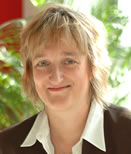Invited Speaker
 |
Ina Schieferdecker
Head of the Competence Center for Modeling and Testing (MOTION) at the Fraunhofer Institute for Open Communication Systems (FOKUS), Berlin.
|
Programme
Aims and Scope
The workshop is devoted to model-based testing of both software and hardware. Model-based testing uses models describing the required behavior of the system under consideration to guide such efforts as test selection and test results evaluation. Testing validates the real system behavior against models and checks that the implementation conforms to them, but is capable also to find errors in the models themselves.
Model-based testing has gained attention with the popularization of models in software/hardware design and development. Of particular importance are formal models with precise semantics, such as state-based formalisms, algebraic specifications, or other mathematical descriptions of possible system behavior. Testing with such models allows one to detect subtle bugs and at the same time to measure the degree of the product's conformance with the model.
Techniques to support model-based testing are drawn from diverse areas, like deductive verification, model checking, constraint solving, control and data flow analysis, grammar analysis, Markov processes, etc.
The intent of this workshop is to bring together researchers and users of model-based testing techniques and tools to discuss the state of the art in theory, applications, tools, and industrialization of model-based testing and related domains.
Workshop History
MBT 2012 is the seventh event in a
series of ETAPS satellite workshops.
MBT 2004, historically the first meeting to
focus on model-based testing, was held March 27-28, 2004, in Barcelona,
Spain.
MBT 2006 was held March 25-26, 2006, in
Vienna, Austria.
MBT 2007 on March 31 - April 1, 2007, in
Braga, Portugal.
MBT 2008 on March 30, 2008, in Budapest, Hungary.
MBT 2009 on March 22, 2009, in York, UK.
MBT 2010 on March 21, 2010, in Paphos, Cyprus.
The proceedings have appeared in ENTCS (volumes 111, 164,
190, 220,
253).
Submission Topics
Original submissions are solicited
from
representatives of
both industry and academia. They are invited to present their work, plans,
and views related to model-based testing. The topics of interest include but
are not limited to:
Online and offline test sequence
generation methods and tools
Test data selection methods and tools
Runtime verification
integrated with testing
Model-based test coverage metrics
Automatic domain/partition analysis
Combination of
formal verification
and testing
Test oracle construction techniques
Scenario based test generation
Language/technology support
for testing
Formalisms
and formal models
suitable for model-based testing
Application of model checking techniques in testing
Use of constraint solving and constraint inference in testing
Game-theoretic and probabilistic approaches to test selection
Model-based testing of non-functional requirements (security, performance, etc.)
Problems and achievements of model-based testing in industry
Important Dates
Paper submissions – December 5 19 28, 2011
Notification of acceptance – January 24, 2012
Final versions – February 8, 2012
Workshop – March 25, 2012
Paper
Submission
RESEARCH PAPERS should be limited to 15 pages in EPTCS format
(eptcsstyle.zip), describing significant
research results based on sound theory or experimental assessment.
We also solicit INDUSTRY EXPERIENCE PAPERS and PRESENTATIONS on the use of
model-based testing in industrial environments and analysis of results
obtained. Industrial papers should be limited to 15 pages. Industrial
presentations may be submitted as annotations only.
Paper submission is now open at http://www.easychair.org/conferences/?conf=mbt2012
Program Committee Co-chairs
Alexander K. Petrenko (Institute for System Programming Russian Academy of Sciences, Russia)
Holger Schlingloff (Fraungofer FIRST, Germany)
Program Committee
Bernhard Aichernig (Graz University of Technology, Austria)
Jonathan Bowen (University of Westminster, UK)
Mirko Conrad (The MathWorks GmbH, Germany)
John Derrick (University of Sheffield, UK)
Bernd Finkbeiner (Universität des Saarlandes, Germany)
Patrice Godefroid (Microsoft Research, USA)
Wolfgang Grieskamp (Google, USA)
Ziyad Hanna (Jasper Design Automation, USA)
Philipp Helle (EADS, Germany)
Antti Huima (Conformiq Software Ltd., Finland)
Mika Katara (Tampere University of Technology, Finland)
Alexander S. Kossatchev (ISP RAS, Russia)
Andres Kull (Elvior, Estonia)
Mounier Laurent (VERIMAG, France)
Bruno Legeard (Smartesting, France)
Bruno Marre (CEA LIST, France)
Alexandre Petrenko (Computer Research Institute of Montreal, Canada)
Fabien Peureux (University of Franche-Comté, France)
Nikolai Tillmann (Microsoft Research, USA)
Jan Tretmans (Embedded Systems Institute, The Netherlands)
Nina Yevtushenko (Tomsk State University, Russia)
|
